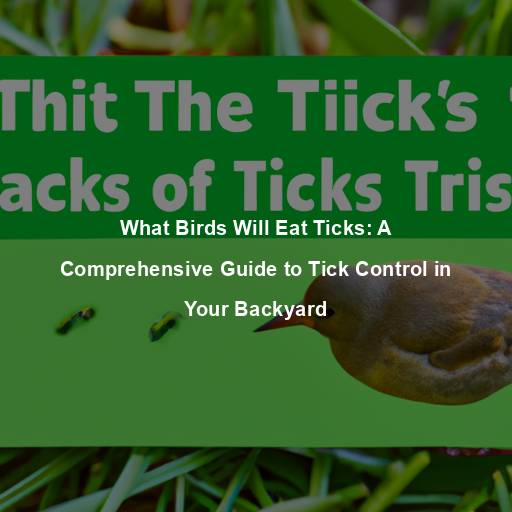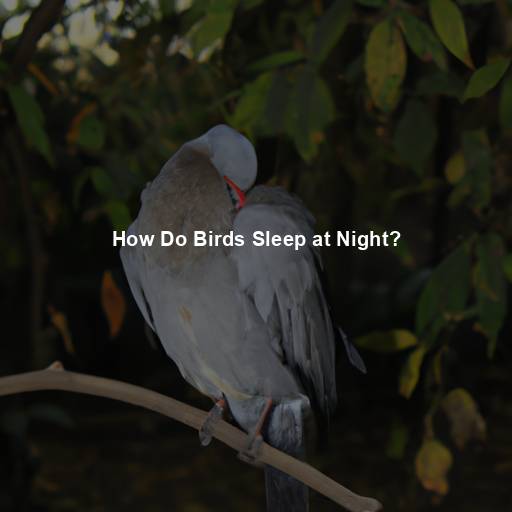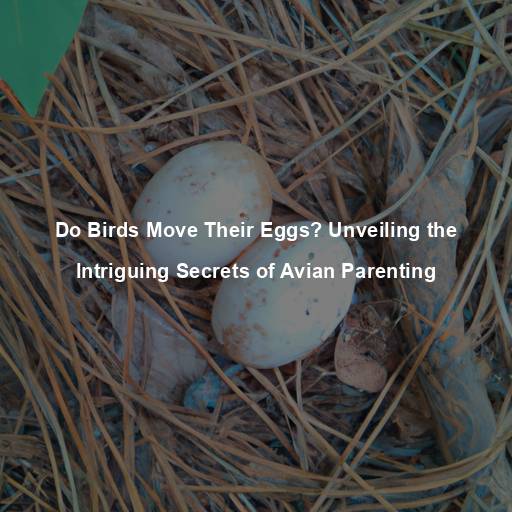What Birds Will Eat Ticks: A Comprehensive Guide to Tick Control in Your Backyard
Last Updated on July 17, 2023 by Evan
Contents [hide]
- 1 Understanding the Importance of Tick Control
- 2 The Ecological Role of Birds in Tick Control
- 3 Creating a Bird-Friendly Habitat
- 4 Additional Tips for Tick Control
- 5 Creating a Tick-Safe Environment
- 6 The Collective Effort for Tick Control
- 7 FAQs: What Birds Will Eat Ticks
- 7.1 What types of birds will eat ticks?
- 7.2 Why do birds eat ticks?
- 7.3 Do all birds eat ticks?
- 7.4 How effective are birds at eating ticks?
- 7.5 Can birds completely eliminate tick populations?
- 7.6 How can I attract birds that eat ticks to my yard?
- 7.7 Are there any other benefits to attracting these birds to my yard?
Understanding the Importance of Tick Control
Ticks – those tiny, bothersome creatures that not only annoy us but also pose a potential threat to our health and our pets. As we strive to be responsible pet owners and guardians of our environment, it becomes paramount to seek out effective, environmentally-friendly ways to combat these blood-sucking pests. While numerous methods exist to tackle tick control, we often overlook the significant role that birds play in this delicate balance of nature. In this captivating exploration, we will unveil the perplexing realm of avian creatures and reveal the unsung heroes who emerge as nature’s remarkable tick controllers.
The Ecological Role of Birds in Tick Control
Nature’s intricate web of life is woven with the enchanting presence of birds, those splendid creatures adorned with vibrant feathers and melodious songs. Captivatingly, it is through their dietary preferences that birds unveil their secret role as guardians of balance within ecosystems. These insectivorous avian beings, stealthily feasting on minuscule creatures like ticks, unknowingly become prolific tick-hunters, skillfully curbing their populations and safeguarding not only fellow feathered friends but also ensuring human and pet well-being, protecting us from the perils of tick-borne illnesses.
Bluebirds: Nature’s Tick-Eating Machines
With their mesmerizing blue feathers and delightful tunes, bluebirds are nature’s secret weapon against pesky ticks. These fascinating avian creatures, known for nesting in cavities, boast an eclectic menu that encompasses a wide variety of insects – a trait that affords them the power to significantly diminish tick populations. Interestingly, bluebirds have a special affinity for earthbound critters, including ticks. So, by inviting these enchanting creatures into your own backyard, not only can you revel in their exquisite presence but also partake in the battle against ticks, all whilst enhancing the allure and elegance of your outdoor haven.
Chickadees: Tiny Tick Terminators
Chickadees, with their cheerful calls and acrobatic antics, are not only delightful to observe but also valuable in tick control efforts. These small songbirds have a voracious appetite for insects, including ticks. Chickadees are known for their ability to extract insects from crevices, making them efficient tick hunters. By attracting chickadees to your yard with bird feeders and native plantings, you can create a welcoming environment for these tick terminators.
Wrens: Tick-Eating Powerhouses
With their harmonious melodies and boundless vitality, wrens reveal themselves as a captivating avian species, but they hold a secret talent: battling against the notorious tick population. These insectivorous warriors exhibit a versatile palate, devouring not only ticks, but also spiders, caterpillars, and an array of insects. Exploring the ground beneath their nimble feet, wrens embark on a tireless quest, scouring the leafy terrain and vegetation for their tiny prey. Enthralling as it may sound, one can attract these resilient creatures and reap the benefits of their tick-fighting prowess by establishing suitable residences, such as birdhouses or flourishing thickets.
Thrushes: Nature’s Pest Controllers
Known for their enchanting melodies and intriguing habits, thrushes like the American Robin and Eastern Bluebird have captivated bird enthusiasts for years. With a varied diet that encompasses earthworms, insects, and succulent berries, these ground-feeding creatures never fail to surprise. While their main focus is on feasting on larger prey like earthworms, thrushes have also been spotted swooping in to snack on ticks. To invite these delightful avian friends into your world and reap the rewards of their pest-controlling prowess, consider transforming your surroundings into a haven of open lawns and lush shrubs.
Creating a Bird-Friendly Habitat
To encourage birds that eat ticks to visit your backyard, it is essential to create a bird-friendly habitat that meets their needs. Here are some tips to attract these tick-controlling birds:
Provide Food Sources
Bird feeders stocked with high-quality seed blends, suet, and mealworms can supplement natural food sources, especially during winter when insects are scarce. Make sure to choose feeders appropriate for the bird species you want to attract and keep them clean and well-maintained.
Plant Native Vegetation
Native plants provide essential food sources, shelter, and nesting sites for birds. Incorporate a variety of native trees, shrubs, and flowers in your landscape to attract a diverse range of bird species. Native plants also support the native insect populations that birds rely on for food.
Offer Water Sources
Birds need water for drinking and bathing, so providing a birdbath or shallow water feature can be a significant attraction for them. Ensure the water source is clean and refreshed regularly to prevent the spread of diseases.
Create Shelter and Nesting Sites
Birds need safe and secure shelter for resting, roosting, and nesting. Planting dense shrubs, installing birdhouses, and leaving dead trees or snags can provide essential shelter and nesting opportunities for birds. Research the specific habitat preferences of the bird species you want to attract and tailor your landscape accordingly.
Additional Tips for Tick Control
Ticks can be a real puzzle to deal with, but don’t fret! Birds can be a surprising solution in tackling these bloodsucking critters. However, to truly crack the code of tick control, it’s key to use a mix of strategies. Here are a few unexpected tips to get you started on your tick-busting adventure.
Maintain a Tidy Yard
Did you know that ticks absolutely love tall grasses, leaf litter, and overgrown vegetation? It can be quite perplexing dealing with these little critters. Thankfully, there’s a burst of hope – by simply transforming your yard into a well-maintained oasis with trimmed grass, raked leaves, and cleared brush, you’ll create an inhospitable environment for these pesky pests. Embrace the power to reduce tick-friendly habitats and reclaim your outdoor spaces with confidence!
Create Tick-Free Zones
Designate specific areas of your yard as tick-free zones, such as play areas or seating areas, by implementing preventive measures. These may include installing physical barriers like fences or using landscaping techniques that deter ticks, such as gravel paths or woodchip barriers.
Consider Natural Tick Repellents
Using natural tick repellents, such as essential oils derived from plants like rosemary, lemongrass, or cedar, can help repel ticks from your yard. However, it is crucial to follow safety guidelines and consult with experts to ensure proper usage and effectiveness.
Regularly Check Yourself and Your Pets
Perform thorough tick checks on yourself, your family members, and your pets after spending time outdoors, especially in areas known for tick infestations. Prompt removal of ticks can significantly reduce the risk of tick-borne diseases.
Warblers: Tiny Tick Hunters
With their breathtaking colors and enchanting melodies, warblers are fascinating creatures that thrive on a diet fueled by tiny insects, including those pesky ticks. These nimble birds gracefully navigate through trees, eager to satisfy their insatiable hunger for bugs. So why not transform your yard into a haven of biodiversity by cultivating a medley of trees and shrubs? By doing so, you’ll not only attract warblers and witness nature’s own vibrant artwork, but you’ll also naturally keep those bothersome ticks at bay, leaving you to revel in the wonders of your outdoor oasis.
Orioles: Tick-Eating Songsters
Orioles, with their bright orange and black plumage, are not only beautiful to behold but also beneficial in tick control efforts. While they are primarily known for their preference for nectar and fruits, orioles also consume insects, including ticks, during the breeding season when they need additional protein. Providing feeders with fruit and nectar, as well as planting fruit-bearing trees and shrubs, can attract orioles and aid in tick reduction.
Swallows: Aerial Tick Predators
Did you know that swallows are not only incredible aerial hunters, but also expert tick predators? These birds have the remarkable ability to swiftly maneuver through the air, effortlessly snatching flying insects, including pesky ticks, along the way. By creating an inviting environment in your yard, complete with suitable nest boxes and open spaces, you can not only witness the mesmerizing flight displays of these agile creatures, but also reap the benefits of their natural tick control expertise. Get ready to be captivated by the burst of nature’s marvels and bid farewell to those tiny, perplexing pests.
Woodpeckers: Tick-Seeking Drummers
There is something mesmerizing about woodpeckers, with their rhythmic drumming and their knack for unearthing secrets beneath the bark of trees. But did you know that these feathered marvels are not just a sight to behold, they are also nature’s tick exterminators? Yes, you heard it right! Woodpeckers have a voracious appetite for insects dwelling in the nooks and crannies of tree trunks, including those pesky ticks that threaten our sanity.
Creating a Tick-Safe Environment
In addition to attracting tick-eating birds to your yard, there are several other measures you can take to create a tick-safe environment for both humans and pets. Let’s explore some additional strategies:
Implement Tick-Repelling Landscaping Techniques
Certain landscaping techniques can help deter ticks from your outdoor spaces. Consider incorporating the following tick-repelling strategies:
To keep those pesky ticks at bay, try putting up a natural blockade using woodchips or gravel. These barriers will keep those moisture-loving critters away from your lawn. Bye-bye, ticks!
- Trim vegetation near play areas: Keeping grass and vegetation near play areas or seating spaces short and well-maintained can reduce tick habitats and minimize contact with these pests.
Maintaining a meticulously manicured yard plays a vital role in curbing the presence of ticks. By diligently raking and promptly removing leaf litter, one can effectively eliminate cozy hideouts that these little critters consider their go-to abode. Embrace the power of tidiness to perplex these unwelcome guests and watch as they scurry away in bewilderment.
Use Tick-Repellent Plants
Did you know that there are actually quite a few plant species that can naturally repel ticks? It’s true! By incorporating these plants into your landscape, you can help reduce tick populations in a more eco-friendly way. So, why not consider adding them to your garden and help keep those pesky parasites at bay?
Discover the extraordinary powers of rosemary, the mighty herb renowned for its uncanny ability to repel ticks and all sorts of infuriating insects. With a touch of nature’s magic, simply plant rosemary in your outdoor haven or harness its potent essential oil to create exceptional tick repellents that will leave those pesky creatures bewildered. Embrace the intriguing properties of rosemary and bid farewell to unwanted intruders in your sanctuary.
With its captivating aroma and botanical allure, lavender has earned its status as a natural tick deterrent. Renowned for its ability to ward off not only ticks but also other pesky insects, this fragrant flower holds the promise of a bite-free haven. Whether you prefer the charm of a lavender-filled garden or the convenience of incorporating its essential oil into homemade repellents, exploring the protective powers of lavender will leave you pleasantly surprised and tick-free.
Marigolds: Nature’s Answer to Unwanted Intruders! Unleash the power of these vibrant flowers to keep those pesky insects at bay, and say goodbye to tick troubles in a breeze. Surround your sanctuary with a tapestry of marigolds, whether in your backyard or charming containers, for a natural deterrent that will leave you scratching your head in amazement. Embrace the floral revolution and let these fragrant wonders work their magic!
Consider Wildlife-Friendly Pest Control Methods
Incorporating wildlife-friendly pest control methods can help maintain a balance between tick control and the well-being of other beneficial organisms. Some alternative pest control methods include:
In the ever-evolving field of pest management, Integrated Pest Management (IPM) takes center stage as a multidimensional approach that puzzles over the complex dance between humans and pests. By seamlessly intertwining biological control, where nature’s warriors swoop in to save the day, with cultural control, in which habitats are ingeniously modified, we dance on the edge of silence, minimizing the ecological footprint of targeted pesticide use. IPM, a harmonious symphony of scientific strategy, orchestrates a chorus where harmony is achieved through the interconnectedness of man and nature.
- Avoiding broad-spectrum pesticides: Broad-spectrum pesticides can harm beneficial organisms, including tick-eating birds. When using pesticides, opt for targeted or organic options that specifically target ticks while minimizing harm to other organisms.
Educate Yourself and Others
In a world filled with uncertainties, it is of utmost importance to equip ourselves with knowledge about the perils that ticks bring, and the preventive measures we can take to safeguard our loved ones. By educating both our immediate circle and the wider community, we can promote a sense of collective responsibility and enhance the safety net against the unseen threats that ticks pose. Let us embark on this journey of awareness together, and build a society that is well-versed in the ways of tick control and disease prevention.
The Collective Effort for Tick Control
When it comes to controlling ticks, there’s no cookie-cutter solution that works for everyone. It’s a puzzle that requires the combined efforts of individuals, communities, and organizations. By unraveling the intricate relationship between birds and tick control, nurturing bird-friendly habitats, embracing innovative landscaping techniques that repel ticks, and staying in the loop about preventative measures, we can join forces to decrease the threat of tick-borne diseases and fashion outdoor spaces that are not only safer but also more inviting for both humans and pets.
Remember, the presence of tick-eating birds in your yard is just one piece of the puzzle. It is essential to adopt a holistic approach that combines various strategies to effectively manage tick populations and minimize their impact on our lives. Let’s embrace our feathered friends, create tick-safe spaces, and enjoy the wonders of nature while safeguarding our well-being. Together, we can make a significant difference in tick control efforts.
FAQs: What Birds Will Eat Ticks
What types of birds will eat ticks?
Several bird species are known to consume ticks as part of their diet. Some common examples include guinea fowl, chickens, wild turkeys, and certain species of songbirds like thrushes, warblers, and sparrows. Additionally, woodpeckers and some raptors such as kestrels and hawks also feed on ticks.
Why do birds eat ticks?
Birds consume ticks for various reasons. Ticks are a good source of protein for them, particularly during the breeding season when birds require a higher amount of energy. Feeding on ticks also helps birds regulate tick populations, keeping them in check and potentially reducing the risk of tick-related diseases.
Do all birds eat ticks?
While many bird species do eat ticks, it is important to note that not all birds incorporate them into their diet. Some birds have different feeding preferences or habitats that do not align with tick-infested areas. However, the birds that do eat ticks contribute significantly to controlling tick populations in their ecosystems.
How effective are birds at eating ticks?
Birds, those little feathered marvels, have quite the knack for keeping tick populations in check. With gusto and finesse, they gobble up those pesky parasites, offering us a glimmer of hope in the battle against ticks. However, let’s not jump to conclusions, for their success in tick control can be influenced by a medley of factors: the specific bird species, the abundance of ticks in the area, and the condition of their habitat. While birds hold a valuable role in this intricate dance of nature, it’s vital to bear in mind that they are just one piece of the puzzle, and additional measures may also need to be taken to keep those ticks at bay. So, let us marvel at the wonders of avian contributions, yet approach the subject with a sense of curiosity and perplexity, acknowledging the complexity of the ecosystem.
Can birds completely eliminate tick populations?
Although birds can have a positive impact on reducing tick populations, it is unlikely that they can completely eliminate them alone. Ticks have multiple life stages and can reside in various environments, making comprehensive control a challenging task. Combining bird predation with other tick control methods, such as habitat management and personal protection, is often the most effective approach in managing tick populations.
How can I attract birds that eat ticks to my yard?
Creating a bird-friendly environment in your yard is key to attracting birds that eat ticks. Provide a diverse range of vegetation, including native plants, trees, and shrubs, as they offer food sources and shelter for birds. Additionally, offer fresh water through birdbaths or small ponds. Avoid using pesticides and insecticides, as these can harm the birds and their food sources. Finally, consider installing bird feeders or nesting boxes to further encourage bird activity and potential tick consumption.
Are there any other benefits to attracting these birds to my yard?
Discover the astonishing wonders that nature has in store for your yard! Unleash the captivating power of tick-munching birds, as they gracefully swoop down, not only eliminating those annoying pests, but also triumphantly conquering a wide array of bothersome insects that threaten your precious plants and gardens. Step into the realm of a perfectly balanced ecosystem and marvel at the intricate dance of destiny as these feathered heroes transform your yard into a haven of health and vitality. And let us not forget the enchantment that awaits, as you immerse yourself in the delightful pursuit of birdwatching, forging an indelible connection to the captivating beauty of the natural world, filling your days with a sense of wonder and joy.







